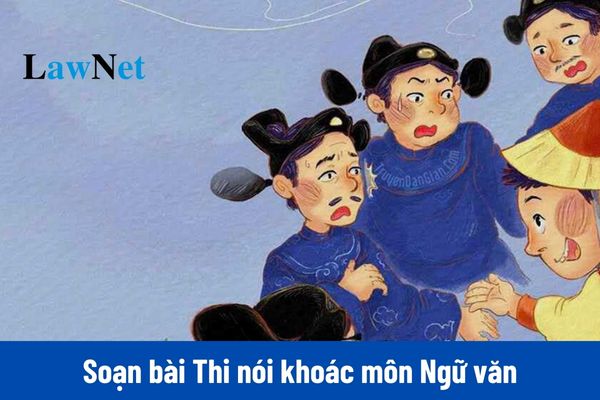What are the guidelines for preparing for the lesson "Thi nói khoác" in the 8th-grade Literature curriculum? What literary knowledge will 8th-grade students in Vietnam learn in Literature?
What are the guidelines for preparing for the lesson "Thi nói khoác" in the 8th-grade Literature curriculum in Vietnam?
The work "Thi nói khoác" is taught in the 8th-grade Literature curriculum in Vietnam. You can refer to the sample lesson "Thi nói khoác" below:
|
Sample lesson "Thi nói khoác"
1. Author
- Folk author.
2. Genre
- The text belongs to the genre of comedy story.
3. Origin and Context
- The text is excerpted from Vietnamese Folk Comedy Stories, Thi nói khoác, Kim Dong Publishing House, Hanoi, 2009.
4. Expression Method
- Expression method: narrative.
5. Text Structure
- Part 1 (From the beginning to ... surrendered): The reason for the boasting contest and the boastful remarks of the mandarins
- Part 2 (The remainder): The humorous ending from the soldier's words.
6. Content Value
- The story revolves around the conversation of four mandarins competing to boast about what they have seen. Thus, the story aims to satirize the boastfulness and cowardice of the mandarins in feudal society.
7. Artistic Value
- Use lively, satirical language to easily create laughter for readers about the story's content.
8. Detailed Understanding of the Work "Thi nói khoác"
The boasting contest of the mandarins and the humorous ending.
- Context of the boasting contest on a large mat, where mandarins eat and drink abundantly, specifically:
+ The first mandarin: begins the boasting story, "saw a large buffalo, licking away an entire pole of seedlings in one go."
+ The second Mandarin: knows the first Mandarin is lying, so he boasts as well, "saw a rope ten times the size of the village's communal house pole."
+ The third Mandarin: boasts "saw a long bridge, standing at this end cannot see the other end, just know that a father-son pair, one on this side, the other on that side, never met. When the father died, the son rushed to attend the funeral, but upon reaching the bridge, found he had already mourned for three years."
+ The fourth mandarin: boasts "saw a tall tree, where bird eggs at the top fell halfway down and magically hatched fully feathered and winged."
- In the first mandarin's statement, readers can easily imagine a buffalo and to restrain it requires a very large rope. The rope resembles the one mentioned by the second mandarin.
- In the third mandarin's exaggeration about the bridge where standing on both banks makes it impossible to see each other; the father on one bank dies, the son on the other crosses only to find he had mourned for three years. Subsequently, the fourth mandarin responds with a tale of a tree where bird eggs fall from the top and hatch midway, fully feathered and fly away as a bridge seen by the third mandarin.
- Story ending: The guard tells the mandarins that they are boasting when he boldly yells, "All liars! Guards, tie them up for me!" He sees this as a way to join in boasting with the mandarins.
>> The story is humorous due to the dialogue between the mandarins. Each one exaggerates, magnifying the truth, resulting in no one conceding defeat, yet they are beaten by the guard's remarks.
|
Note: Information is for reference only!

What are the guidelines for preparing for the lesson "Thi nói khoác" in the 8th-grade Literature curriculum? (Image from Internet)
What literary knowledge will 8th-grade students in Vietnam learn in Literature?
Under Section 5 of the General Education Program for Language promulgated under Circular 32/2018/TT-BGDDT, 8th-grade students in Vietnam will learn the following literary knowledge in Literature:
- Imagination in literary works
- Titles and methods of naming texts
- Theme and subject matter, methods to determine themes; structure
- Plot, context, character, language in comedy, historical stories
- Single-track and multi-track plots
- Main artistic techniques of satirical poetry
- Some poetic elements of Thất ngôn bát cú and Tứ tuyệt law Đường poetry: structure, rhyme, meter, rhythm, balance
- Some formal elements of a poem: vocabulary, imagery, structure, emotional flow
- Conflict, action, character, dialogue, and satirical techniques in literary scripts (comedy)
- Some formal elements of free verse (six, seven syllables): number of lines, words, rhyme, rhythm
- Reader and their unique reception of a literary text
- Content reflection and author's perspective on life and human beings
What are the requirements on contents of the lower secondary education in Vietnam?
Under Article 30 of the Education Law 2019, the requirements on contents of the lower secondary education in Vietnam are as follows:
- The contents of general education must ensure the popular, basic, comprehensive, career-orienting, and systematic characteristics; linking with the realities of life, appropriate to the psycho-physiological characteristics of students, meeting the objectives of education at each level.
- Lower secondary education shall consolidate and develop the contents learned in primary education, guarantee students the basic general knowledge in Vietnamese, mathematics, national history, other knowledge in social sciences, natural sciences, law, informatics, foreign languages; with introductory understanding on techniques and career-orientation;


